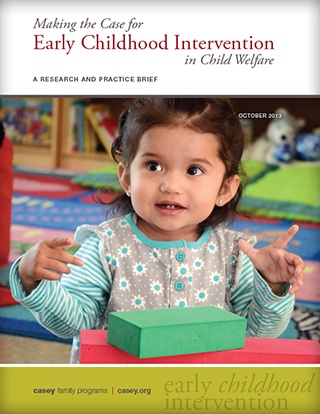Making the Case for Early Childhood Intervention in Child Welfare: A Research and Practice Brief
The number of youth in foster care nationally has declined over the past decade, however, similar declines have not occurred for children under six years of age.
The brief, “Making the Case for Early Childhood Intervention in Child Welfare,” describes a national scan of interventions targeting families with young children and makes several recommendations to safely reduce the number of young children in foster care, including:
- Closely follow the documented outcomes of the Title IV-E Welfare Demonstration Projects.
- Employ a cross-systems collaboration approach and develop better linkages with integrated early learning and development systems.
- Integrate and coordinate services with federally funded home visiting programs in states.
- Educate and engage judicial and court personnel.
- Incorporate and maintain focus on early childhood development, trauma-informed care, young children’s mental health and the importance of secure relationships in child welfare services, programs and policies.
- Closely manage the use of psychotropic drugs in young children.
- Address racial disproportionality.
- Continue to evaluate programs and strategies and communicate these results to increase the menu of evidence-informed and evidence-based programs for jurisdictions to draw upon to effectively work with this population.
The report concludes that because early childhood is a foundational period of development, addressing the unique needs of this population could produce tremendous opportunities to improve child welfare systems and the health and well-being of young children.
